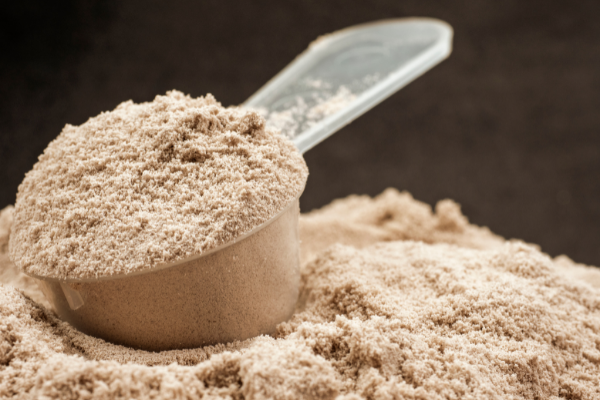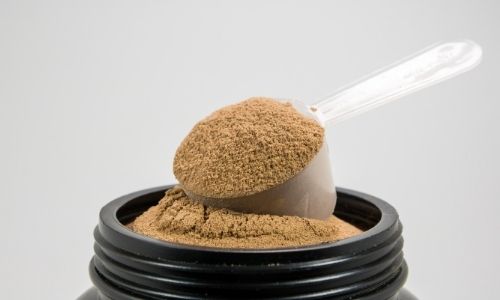Whey Protein is commonly used as supplementation since it seems an easy option to help with muscle protein synthesis and increase muscle mass. It is pretty popular with athletes and bodybuilders. However, it is essential to know whether it is safe to consume whey protein or not. We know that almost all things have their side effects. You must be wondering if whey protein has side effects too. If yes, what are they?
We are here to address these queries for you in this article. Backed by scientific reports, we will see whether the side effects attributed to whey protein are true or not. Read on to find out.
Is Whey Protein Safe To Consume?

Whey protein is largely considered a safe supplementation with a lot of health benefits. However, a lot of speculations are being made with regard to whey protein’s downsides. While not all of them are true, there are many side effects that you must be cautious of. It is also equally necessary to debunk the false side effects attributed to high protein supplements in general or whey protein in particular. Let’s find out more about the actual side effects of whey protein and also debunk the myths about it.
1. Whey protein might lead to digestive issues.
Whey protein can be a little troublesome when it comes to its digestion aspect. Many people find it challenging to digest whey protein and experience problems such as bloating, cramps, diarrhea, and gas, as maintained by the report.
2. Whey protein consists of lactose and can cause problems for lactose-intolerant people. As per the report, lactose intolerance is a condition in which there is either insufficient lactase level or a complete absence of lactase, hence making the digestion of lactose difficult.
However, there is a solution for people with lactose intolerance, as argued by the study. Switching to Whey protein Isolate may help since, during its processing, a significant amount of lactose and fat is removed as compared to whey protein concentrate. So, if whey protein concentrate is not suiting you, choosing whey protein isolate might help.
3. Effect of Whey Protein on kidneys
The study concludes that increased protein intake might have an adverse consequence on kidney function in the long term. However, another study maintains that while reducing protein intake might be appropriate in the treatment of individuals with existing kidney problems, not much evidence is found on the impact of kidneys of a healthy person due to high protein intake.
Hence, in case of already existing kidney problems, it would be best to consult a nutritionist before taking whey protein.
4. Whey protein and Osteoporosis
Some controversy has been going on over the intake of high protein, and many ill health effects are attributed to it. A high protein intake is associated with the excretion of calcium, said to increase the risk for Osteoporosis.
However, this report declares the claim unfounded since no substantive evidence has been found that would demonstrate that high protein intakes will have adverse effects in healthy, exercising individuals.
In fact, the report maintains that whey protein can be good for bone health and promote new bone formation. The components of whey can also prove to be good for tooth health by protecting against tooth tissue demineralization.
5. Whey protein allergy
People who are allergic to dairy products might face a few problems with whey protein consumption. Whey protein consists of milk proteins that may trigger allergic reactions in people who are allergic to dairy products. Whey protein consumption can make you sick if you are allergic to dairy. The best thing to do would be to avoid whey protein in case of sensitivity towards dairy products.
Other than that, excess consumption of whey protein may lead to digestion issues, with symptoms such as diarrhea, pain, cramps, nausea, etc.
6. Effect of whey protein on liver
Not much scientific evidence is available to suggest that whey protein affects the liver. As per this report, no scientific evidence whatsoever is found that would support the claim that a high protein diet causes liver problems. In fact, protein is needed to promote liver tissue repair. Other than that, it is also required for preventing fatty infiltration in the liver by providing lipotropic agents for the conversion of fats to lipoprotein.
7. Raw whey protein High blood pressure
There are many claims that suggest that a high protein diet could be associated with blood pressure. However, scientific data is not found in this matter, as suggested by the report. These claims hence, have no scientific backing.
8. Whey protein may cause constipation.
Many people suffer from constipation as a side effect of whey protein consumption. It is especially so for those who have a lactose intolerance problem, as the report says. If you are not eating enough fruits and vegetables, you are more likely to get constipated.
Hence, it is advisable to consume fruits and vegetables, which can help with this problem, as the study suggests. Along with fiber, taking fluids can also prove to be helpful in dealing with constipation.
By taking care of your food and having a balanced diet rich in fiber and fluids, you can defeat the problem of constipation caused by whey protein.
How Much Protein is Safe to Consume on a Daily Basis?
The recommended intake of whey protein is 25 – 50 grams per day, which is one or two scoops. The serving instructions on your whey protein package can also help you give an idea.
There is no point in taking more whey protein than recommended, as it is unlikely to offer more benefits. Also, in case of digestion issues or lactose intolerance, you can try switching to whey protein isolate.
For those who are allergic to dairy, plant-based protein powders, such as soy or hemp protein, can be an option.
Read More: How Much Whey Protein Should You Take?
You May Like to Read:
The Best Time to Take Whey Protein
FAQs
Q. How are Whey Protein Concentrate and Whey protein Isolate different?
There are mainly three kinds of whey proteins on the basis of concentration- Whey Concentrate, Whey Isolate, and Whey Hydrolysate. Whey protein concentrate nearly has 80% of whey protein in it, while Whey Isolate has 90% of protein with relatively low fat and lactose in it.
Q. How is whey protein prepared?
Whey protein powder is the by-product you get from cheese making. After curdling of milk, the solid part we get is cheese, and the liquid part is whey. It is a milky liquid and is extracted and collected while removing components like fat, water, and carbohydrates from it. Whey goes through a few procedural steps in order to become what we know as Whey Protein Powder.
Conclusion
There is no doubt about the health benefits of whey protein and how useful it can be for muscle training. It is undoubtedly one of the best protein supplements, and research backs this claim. However, there are a few side effects also associated with whey protein consumption, about which you should be careful.
Talking to your dietician for a piece of good advice can always help. Moreover, the type of whey protein that you are consuming also determines the reaction your body will have. If whey protein concentrate is not suiting you, whey protein isolate might.



